Are Tradition and Modernity antithetical to each other? Comment.
Section: A
Sociology Paper 2023 Analysis
(Paper 2: Unit-11 Impact of colonial rule on Indian society; Modernization of Indian tradition)
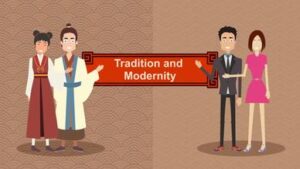
Question: 1 (d) Are Tradition and Modernity antithetical to each other? Comment.
(10 Marks)
|
Introduction: Introduce with Antithetical Relation Between Modernity and Tradition in Europe and then Write in Brief that Indian Context Differs Main Body: Relation Between Tradition and Modernity in Indian Context with Viewpoint of D.P. Mukerjee, Yogendra Singh, M. N. Srinivas, Louis Dumont, Dipanker Gupta etc. to Highlight Multiple Responses Conclusion: On the lines of multiple modernities |
Introduction:
Yogendra Singh argues that modernity is a universal cultural phenomenon, while tradition is local and specific to immediate societies. In the European context, modernity is the antithesis of tradition in Europe. It was considered modernity emerged to completely replace the tradition. However, this view is not universally accepted. In Indian context the modernity and tradition interacts in multiple ways. In India the modernity came from the multiple sources. It is result of various heterogenetic sources and orthogenetic sources. And accordingly the relation between modernity and tradition also multiple and beyond the singular antithetical relation.
Main body:
The relation between tradition and modernity can be explained as follows:
- Multiple modernity: According to Yogendra singh when the ideal concept of modernity encounters local communities, it can lead to two outcomes: adaptive changes within local traditions or the rejection and redefinition of modernization.
- Dialectical Relationship: P. Mukerjee’s perspective highlights the dialectical relationship between tradition and modernity. This viewpoint suggests that while there may be conflicts and contradictions, it’s not a straightforward case of one replacing the other. Instead, tradition and modernity can coexist, with societies adapting and evolving through this interaction.
- Selective And Segmental Modernization: There was, however, one important feature of Indian modernization during the British-period. The growth of this process was selective and segmental. It was not integrated with the micro-structures of Indian society, such as family, caste and village community.
- Westernization and Sanskritization: According to Srinivas the definition and meaning of modernisation boils down to the following points :
-
- Modernisation and westernisation are interchangeable , though in India ‘s social change westernization is preferable.
- There is sanskrtization at level of caste system; there is westernization or modernization at the nation state level .
- Modernisation is more widespread at the individual level then sanskritisation.
- Autonomy of Polity and Caste: Louis Dumont’s perspective highlights the autonomy of polity and caste in India. It implies that modernity doesn’t necessarily disrupt all aspects of traditional social structures. In this view, certain domains can modernize independently while preserving aspects of tradition.
- Modernity as an Attitude: Dipanker Gupta’s definition of modernity as an attitude focusing on universalistic norms and individual dignity underscores that modernity is not just about technology and material progress. It’s also about evolving attitudes and values.
-
- According to Dipanker Gupta the mode of relations among people in our country is still not modern. Family connections, privileges of caste and status, as well as the willingness to break every law in the book characterise our social relations very deeply. In this context, India, like many other societies, is on a journey toward a more modern outlook.
- Resistance to Modernity: The resistance to modernity highlighted in your content reflects the challenges that can arise when traditional values clash with modern demands. For instance, secularism , untouchability, non parochialism are cultural demands of modernisation in contemporary India which its traditional value system continues to resist. This resistance doesn’t mean that tradition and modernity are inherently antithetical but rather that there are tensions and conflicts that need to be navigated.
Conclusion:
The concept of “multiple modernities” recognizes that modernity is not a one-size-fits-all phenomenon. Instead, it is shaped by diverse cultural, historical, and societal contexts, leading to various expressions and adaptations. This perspective highlights the richness and complexity of human societies as they navigate the evolving relationship between tradition and modernity. The Indian society manifests these multiple maternities.
Related Blogs…
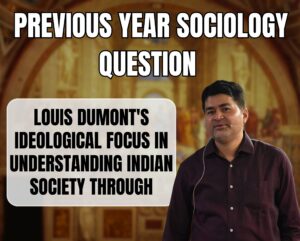 |
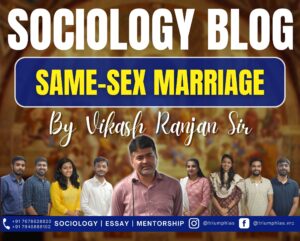 |

To master these intricacies and fare well in the Sociology Optional Syllabus, aspiring sociologists might benefit from guidance by the Best Sociology Optional Teacher and participation in the Best Sociology Optional Coaching. These avenues provide comprehensive assistance, ensuring a solid understanding of sociology’s diverse methodologies and techniques.
META TAGS:
Tradition and Modernity, Tradition and Modernity in Sociology, Tradition and Modernity in India upsc, Tradition and Modernity in India, Tradition and Modernity Indian Society, Multiple Modernities, Cultural Phenomenon, Sociological Perspectives, Yogendra Singh, D.P. Mukerjee, M.N. Srinivas, Louis Dumont, Dipanker Gupta, Westernization, Sanskritization, Dialectical Relationship, Selective Modernization, Autonomy of Polity, Modernity Attitude, Resistance to Modernity, Adaptive Changes, Social Change, Traditional Values, Modern Demands, Cultural Demands, Social Relations.
Why Vikash Ranjan’s Classes for Sociology?
Proper guidance and assistance are required to learn the skill of interlinking current happenings with the conventional topics. VIKASH RANJAN SIR at TRIUMPH IAS guides students according to the Recent Trends of UPSC, making him the Best Sociology Teacher for Sociology Optional UPSC.
At Triumph IAS, the Best Sociology Optional Coaching platform, we not only provide the best study material and applied classes for Sociology for IAS but also conduct regular assignments and class tests to assess candidates’ writing skills and understanding of the subject.
Choose The Best Sociology Optional Teacher for IAS Preparation?
At the beginning of the journey for Civil Services Examination preparation, many students face a pivotal decision – selecting their optional subject. Questions such as “which optional subject is the best?” and “which optional subject is the most scoring?” frequently come to mind. Choosing the right optional subject, like choosing the best sociology optional teacher, is a subjective yet vital step that requires a thoughtful decision based on facts. A misstep in this crucial decision can indeed prove disastrous.
Ever since the exam pattern was revamped in 2013, the UPSC has eliminated the need for a second optional subject. Now, candidates have to choose only one optional subject for the UPSC Mains, which has two papers of 250 marks each. One of the compelling choices for many has been the sociology optional. However, it’s strongly advised to decide on your optional subject for mains well ahead of time to get sufficient time to complete the syllabus. After all, most students score similarly in General Studies Papers; it’s the score in the optional subject & essay that contributes significantly to the final selection.
“A sound strategy does not rely solely on the popular
Opinion of toppers or famous YouTubers cum teachers.”
It requires understanding one’s ability, interest, and the relevance of the subject, not just for the exam but also for life in general. Hence, when selecting the best sociology teacher, one must consider the usefulness of sociology optional coaching in General Studies, Essay, and Personality Test.
The choice of the optional subject should be based on objective criteria, such as the nature, scope, and size of the syllabus, uniformity and stability in the question pattern, relevance of the syllabic content in daily life in society, and the availability of study material and guidance. For example, choosing the best sociology optional coaching can ensure access to top-quality study materials and experienced teachers. Always remember, the approach of the UPSC optional subject differs from your academic studies of subjects. Therefore, before settling for sociology optional, you need to analyze the syllabus, previous years’ pattern, subject requirements (be it ideal, visionary, numerical, conceptual theoretical), and your comfort level with the subject.
This decision marks a critical point in your UPSC – CSE journey, potentially determining your success in a career in IAS/Civil Services. Therefore, it’s crucial to choose wisely, whether it’s the optional subject or the best sociology optional teacher. Always base your decision on accurate facts, and never let your emotional biases guide your choices. After all, the search for the best sociology optional coaching is about finding the perfect fit for your unique academic needs and aspirations.
Follow us :



Find More Blogs…
| Compare and contrast Karl Marx’s and Max weber’s | Karl Marx- Historical Materialism |
| Talcott Parsons : Social system | Scope of the subject and comparison with other social sciences |

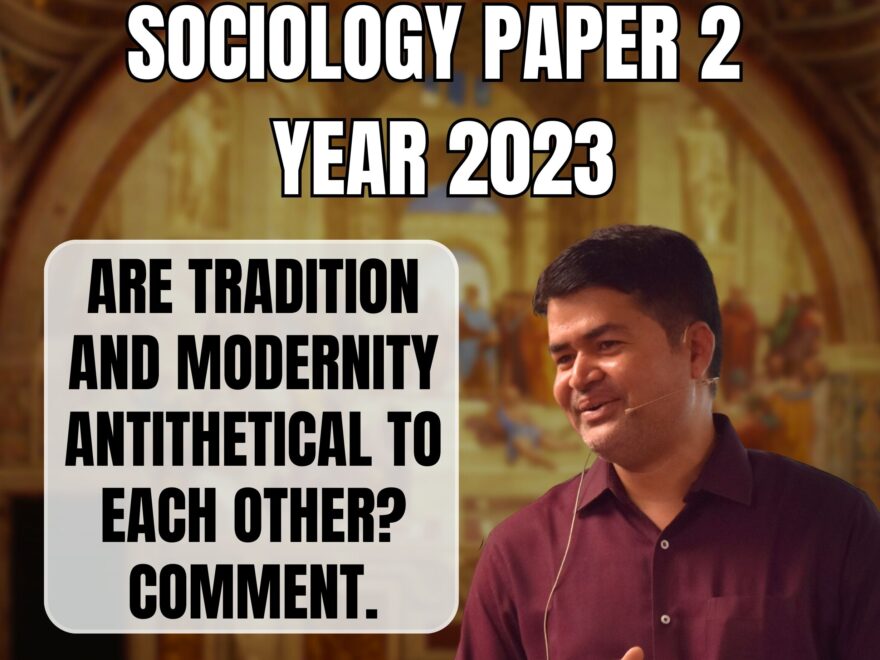

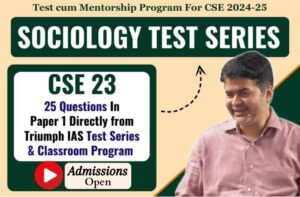
One comment